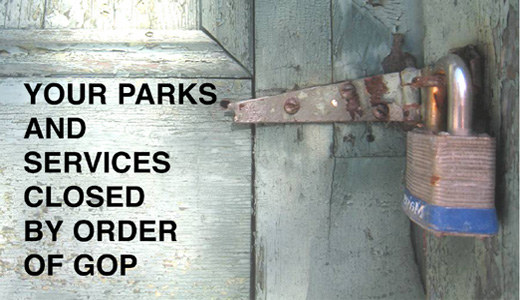
Republicans say they are negotiating in good faith to prevent a federal government shutdown Friday at midnight. But the GOP is exposing its determination to force the shutdown, regardless of any Democratic concessions.
Senate Majority Leader Harry Reid said yesterday, after a private meeting with House Speaker John Boehner that the Republican leader “has a choice to make, and not much time to make it: He can either do what the tea party wants, or what the country needs.”
Boehner has now signaled to both Reid and the White House that the GOP is unwilling to support any budget compromise that can’t garner the votes of 218 Republicans in the House. That is the number of GOP lawmakers, tea partiers among them, that Republican party leaders believe are in “safe” seats that Democrats cannot win. (Earlier Boehner had indicated he would accept a compromise that would pass with bi-partisan support, regardless of Republican defections.)
Unless Boehner now reverses himself, Reid said, he is giving the tea party veto power over any proposal that would prevent a government shutdown.
New York’s Democratic Sen. Chuck Schumer said that if talks collapse and a government shutdown happens, it will be the tea party’s fault. “Tea party Republicans have an ideology to just get rid of all government, regardless of whether programs are working,” said Schumer.
The GOP approach during negotiations has been to up the ante every time they win a concession from Democrats.
President Obama, angry with Republicans for not compromising said he has already met the speaker more than half way. “We don’t have time for games. What we can’t do is have a ‘my way or the highway’ approach to the problem. If we start applying that approach, where I’ve got to get 110 percent of everything I want or else I’m going to shut down the government, we’re not going to get anything done this year and the American people are going to be the ones who suffer.”
“It seems every step we take, it’s something just to poke us in the eye,” said Reid. “They are not trying to arrive at the finish line. It appears that they’re going to do everything they can to satisfy the tea party.”
Boehner’s proposed cuts now translate into a federal budget that is $40 billion smaller than the one in effect when he took over as majority leader in January and $80 billion below the president’s request for the fiscal year. Boehner would drastically slash things like cancer research, aid to students and public broadcasting. On top of those cuts, House Budget Committee Chairman Paul Ryan, R-Wis., wants a second round of $100 billion plus cuts from Obama’s 2012 budget for domestic agencies and foreign aid. The so-called non-security category of spending would drop to $360 billion under Ryan’s plan, compared with $465 billion in Obama’s budget proposal.
“This is not a budget,” said Ryan, when he unveiled his plan. “This is a cause.”
The partial government shutdown now obviously planned by Republicans would inflict immediate damage on many programs the Republican budget proposals intend to slash or eliminate anyway.
There would be an immediate closing of all national parks and shutdown of all passport offices. The IRS taxpayer information hotline would be turned off, just a week before millions will file their taxes on the April 18 deadline.
The National Zoo would close and the IRS would stop issuing refund checks.
During the shutdowns of 1995 and 1996, cleanup work on toxic waste sites was halted because contractors could not be paid and Environmental Protection Agency officials could not monitor cleanup work. Work on more than 3,500 bankruptcy cases was suspended.
Payment of unemployment benefits would be affected because they are jointly paid by the federal government and the states. When the Republicans forced a shutdown in 1995, with a jobless rate of 5.6 percent, states were able to draw on their trust funds to pay the federal portion. Today those funds are gone, with many states borrowing from the federal government.
Federal courts say they can continue for ten days, using money from fees paid by people who have filed lawsuits. Beyond that they are unsure about whether they can operate.
Federal grants for a variety of state programs, including research, higher education and training local law enforcement officials could be delayed
Closing of national parks has a domino effect, causing states to lose tourism business and the tax revenues it generates.
States have workers who are paid with federal funds. Massachusetts, for example, says it has 4,500 workers paid from various federal sources and that those payrolls could be affected.
Students will also suffer from a shutdown. With cash strapped states reducing the amount of support they provide for higher education, students will bear the brunt of any cut in federal funds that help states provide higher education services or grants.












Comments